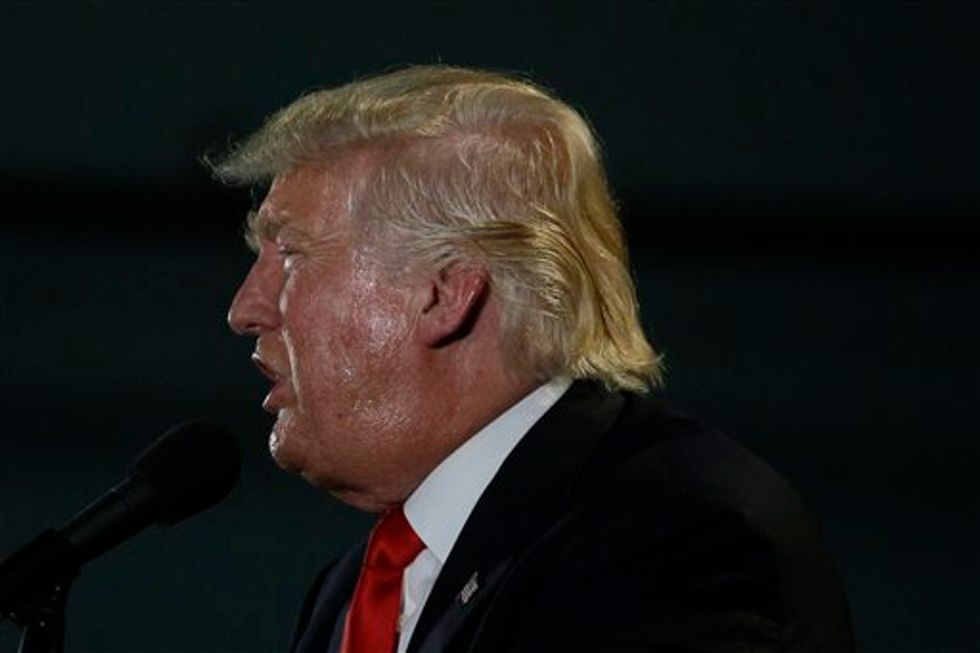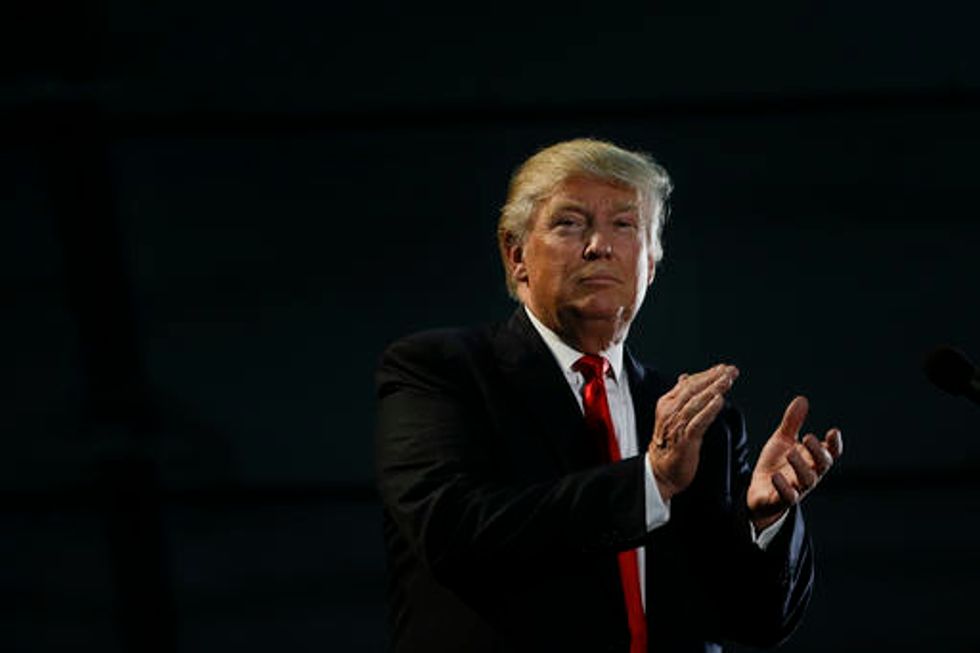
Republican presidential candidate Donald Trump speaks during a rally, Thursday, June 2, 2016, in San Jose, Calif. (AP/Jae C. Hong)

WASHINGTON (AP) — The federal judge who's hearing a Trump University lawsuit is "a hater of Donald Trump" and ought to be removed from the case. So says Donald Trump, in just one of the recent comments by the presumptive Republican presidential nominee that have legal experts worrying about his commitment to an independent judiciary and his views on presidential powers.
In the midst of a heated presidential campaign, Trump has expressed unusually personal criticism — focusing on the judge's Mexican heritage — though his lawyers have never actually sought to have the judge removed.
His comments are bringing overwhelming disapproval from politicians and lawyers in his own Republican Party. On Friday, House Speaker Paul Ryan said of the statements about the judge: "It's reasoning I don't relate to, I completely disagree with the thinking behind that."

And conservative legal scholars say Trump's statements reinforce their worries that he seems to think he can do whatever he wants and disregard rules and conventions that constrain other political candidates.
"The concern is that he would act unbounded in the presidency, in a way that doesn't follow the law," said John McGinnis, a Northwestern University law professor.
Criticism of the Supreme Court and the rest of the federal judiciary has been a regular feature of recent Republican presidential campaigns, including proposals to strip federal judges of lifetime tenure and reduce the budgets of liberal-leaning courts.
Those ideas, though, did not single out judges or focus on race, ethnicity or religion.
"Here it's just about Trump," said Case Western Reserve University law professor Jonathan Adler.
More troubling, Adler said, is that the recent comments seem to fit a pattern of intemperate remarks Trump has made during the campaign.
"He said he would give military officers unlawful orders and expect them to comply," Adler said, referring to Trump's claim that the military would follow his orders to torture suspected terrorists. Trump has since backed off on that.
"He has repeatedly given indications he has no appreciation for the rule of law," Adler said.
Trump made his first reported comments about U.S. District Judge Gonzalo Curiel in February, linking Curiel's Mexican heritage with what Trump described as the judge's "tremendous hostility" over Trump's plan to build a wall along the Mexican border. Trump has variously referred to Curiel as Spanish, Mexican and Hispanic and has called the judge "a hater of Donald Trump." He told The Wall Street Journal that Curiel has "an absolute conflict of interest" because of his heritage as well as "an inherent conflict of interest" because Trump wants to build the border wall.
Curiel is a native of Indiana whose parents emigrated from Mexico. He received undergraduate and law degrees from Indiana University and served as a federal prosecutor and a judge in the California state judicial system before being nominated to the federal bench by President Barack Obama in 2011.
Trump University is the target of two lawsuits in San Diego and one in New York that accuse the business of fleecing students with unfulfilled promises to teach secrets of success in real estate. Trump has maintained that customers were overwhelmingly satisfied.
The school emerged as an issue in a February Republican presidential debate, after which Trump made his first comments about Curiel.
The judge seemingly raised Trump's ire anew last week when he ordered the release of documents that had been sealed. Trump's campaign and private lawyers handling the lawsuits did not respond to requests for comment on Friday.
Trump's contention that Curiel is biased against him because of Trump's border plan is "ridiculous," said Josh Blackman, a young conservative law professor at the South Texas College of Law in Houston.
[sharequote="center"]"If that's the new standard for recusal, every judge in the federal judiciary who has some ethnicity or religion or race that affects a case has to recuse." - Josh Blackman[/sharequote]
American Bar Association president Paulette Brown said personal criticism of a judge undermines judicial independence.
"Anyone running for the highest office in the land should understand that the independence of the judiciary is essential for an effective and orderly government and justice system," Brown said.
Federal judges have repeatedly rebuffed calls to step aside from cases over race, religion and ethnicity. U.S. District Judge Paul Borman, who is Jewish, turned down a request to withdraw from a case of a Palestinian immigrant accused of lying about her role in a fatal terrorist attack. "Like every one of my colleagues on the bench, I have a history and a heritage, but neither interferes with my ability to administer impartial justice," Borman said.
He later did step aside from the case, after discovering his family had an investment in the Jerusalem supermarket the woman helped bomb in 1969. Financial interests often are involved when judges withdraw.
The prospect of a choice between Trump and Democratic front-runner Hillary Clinton leaves some conservative scholars cold.
Former federal appeals court judge Michael McConnell, an appointee of President George W. Bush, said he is not encouraged by the behavior of the leading candidate of either party, citing Clinton's troubles over the private email server she used when she was secretary of state.
"They both seem to think they're above the law. Trump is much cruder and more personal and vitriolic and quotable, but the fundamental question is whether our leaders believe that the law applies to them," said McConnell, who teaches constitutional law at Stanford Law School.